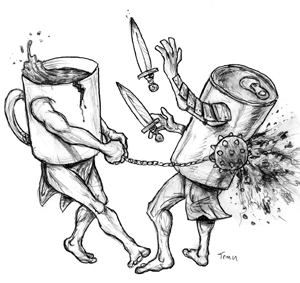 Scott Bressler
Scott BresslerSoft drinks rot your teeth, break your bones, screw up your body’s ability to experience arousal, burn your stomach lining and destroy your life. Anybody who drinks Coca-cola, Sprite, Mountain Dew or any of the other nutritionless, body-assaulting products advertised by corporate suitsters who don’t care if their product makes you overweight or sterile is ridiculous. It is extremely easy to cut soft drinks out of your life – just drink water instead. There is no reason to disrespect yourself and all human life by drinking pop.
That’s what I was thinking, at least. I mean, really, not drinking pop would probably be an easy thing to do that would significantly improve your long-term bodily well-being. I don’t drink pop. It made sense to me.
But then I threw the idea out to my Diet Coke-drinking friend. I harped on her for a while about it, cited the weird chemicals found in the list of ingredients, and generally made a case for the fact that it is bad news. Then she asked, “Well what about coffee? That does the same stuff.” And I said, “Oh, but that’s ok.” I was, indeed, serious. But the point, after a few seconds of reflection, became clear. I do drink coffee occasionally, so I don’t find it particularly offensive; but I abstain from soft drinks, out of habit I guess, so I declare them to be the cause of all that is wrong in the world.
It appears that it is easy to make a case for just about anything, no matter which side you are on. Take coffee, for example. The anti-coffee individual can say it stains your teeth, has more caffeine than most soft drinks, is grown by poor exploited peasants in South American countries, gives you heart disease, and on and on. The coffee advocate can say that it tastes good, it doesn’t have a bunch of sugar like pop does, it is an authentic beverage that has been around for many centuries, it prevents diabetes and certain cancers, etc. etc.
The only real truth that one can get out of such an argument is that people will find evidence for the side of something they naturally favor, and use it to back up the view that they originally held anyway because of personal preference. Most “evidence” to support a certain view, then, is rationalization. It is searching, after the opinion is firmly and arbitrarily entrenched in one’s mind, for facts to support that opinion.
And if you don’t buy that, at least borrow this: almost anything can be defended. There are few things in the world that are unarguable, but those that are arguable are (we all know the futility of debating) hardly worth arguing about. For people to say “This is right, and that is wrong” is a fallacy. It would be more accurate to take a more utilitarian approach, and choose what is “most right” as what has the most benefits. But then again, the value placed on specific benefits are a result of personal value systems, so it ends up being a personal choice anyway.
I guess it is all right to assert things like “There should be three more minutes added on to the time between classes at Wash. U.” like the Student Life Staff Editorial did Monday (“Seven minutes in hell,” Jan. 29, 2007). But it’s important to remember that everyone has their own reason for doing things – there is a reason it is seven minutes and not 10. And often those reasons are things that a person naturally tending toward the opposite belief may not have even thought of.
An upshot here is that it is not really worth it to stake the whole of your being on one argument. I mean, say you have a purpose, like helping people – that’s doing something unarguably good. But to support a certain, say, political view as if it is the same thing, as clear and unarguable, as helping people, is to declare a right that you do not have – a declaration that is very dangerous. You might believe you have more pluses than the other team, but you do not have the unarguable right of way, and you ought not act like you do.
It is being obtuse to pretend that what one believes is obvious, that it is the truth. Like Jack Kerouac says in “The Dharma Bums,” “the final sin, the worst, is righteousness.” Believing that my own beverage of choice is far more acceptable than another’s is just as absurd as believing the same about any of my other opinions. Who am I to judge?
Dennis is a freshman in Arts & Sciences. He can be reached via e-mail at djsweene@artsci.wustl.edu.